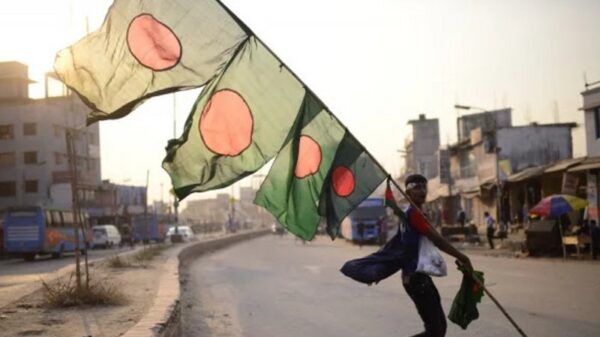A ceasefire deal to end 13 months of conflict between Israel and the Lebanese armed group Hezbollah has taken effect.
The US and France said the agreement would “cease the fighting in Lebanon, and secure Israel from the threat of Hezbollah and other terrorist organisations operating from Lebanon”.
Hezbollah has been given 60 days to end its armed presence in southern Lebanon while Israeli forces must withdraw from the area over the same period.
This is what we know about the ceasefire from the agreement itself and official briefings.
The ceasefire is meant to be permanent
US President Joe Biden told reporters on Tuesday night that it was “designed to be a permanent cessation of hostilities”.
The 13-point agreement between the governments of Israel and Lebanon – and not Hezbollah – also says both countries are “prepared to take steps to promote conditions for a permanent and comprehensive solution”.
It states that the Lebanese government will “prevent Hezbollah and all other armed groups in the territory of Lebanon from carrying out any operations against Israel”.
Israel, meanwhile, will “not carry out any offensive military operations against Lebanese targets, including civilian, military, or other state targets, in the territory of Lebanon”.
The basis of the deal, it notes, is the “full implementation, without violation” of UN Security Council resolution 1701, which ended the last war in 2006.
The resolution required, among other things, Hezbollah to remove its fighters and weapons from the area between the Blue Line – the unofficial border between Lebanon and Israel – and the Litani river, about 30km (20 miles) to the north.
Israel said that was never implemented, allowing Hezbollah to build extensive infrastructure in the area, while Lebanon said Israel’s violations included military flights over its territory.
The agreement also notes that the resolution reaffirmed previous Security Council calls for the “disarmament of all armed groups in Lebanon”.
10,000 Lebanese troops will deploy to the south
Biden declared that “Hezbollah terrorist infrastructure in southern Lebanon will not be allowed to be rebuilt”.
The ceasefire agreement says Israeli forces will move south of the Blue Line “in a phased manner” within 60 days. The Lebanese army’s troops will deploy “in parallel” to the positions.
A senior US official said this was “to prevent any vacuums from being formed”.
Without mentioning Hezbollah, the agreement says the Lebanese army will “dismantle all infrastructure, and military positions, and confiscate all unauthorised arms” in what it calls the Southern Litani Area, as well as stop the unauthorised entry of weapons into Lebanon and dismantle any unauthorised weapons production facilities.
The agreement also says that “Lebanon’s official military and security forces, infrastructure and weaponry will be the only armed groups, arms, and related material deployed” in the Southern Litani Area. The only exception is the UN peacekeeping mission in southern Lebanon, Unifil, which has about 10,000 troops.
The US official said that meant Hezbollah would have to pull back its fighters and “all their heavy weaponry” to the north of the area.
A map of the Southern Litani Area shows that it extends north of the river in some locations, notably around the village of Yohmor, and extends to Hasbaya and Chebaa in the east.
A total of 10,000 Lebanese army troops will eventually be deployed to the south, according to the agreement.
However, questions remain about the troops’ role in enforcing the ceasefire, and whether they would confront Hezbollah if needed, which would have the potential to exacerbate tensions in a country where sectarian divisions run deep.
The Lebanese army has also said it does not have the resources – money, manpower and equipment – to fulfil its obligations, although the agreement says the US and France will work with the international community to provide support and improve its capabilities.
Many Western officials say Hezbollah has been weakened and that this is the moment for the Lebanese government to re-establish control over all the country’s territory.
The US and France will monitor implementation
The US and France will join the existing Tripartite Mechanism involving Unifil, the Israeli military and Lebanese army that was set up to help reach agreements on contentious issues.
The ceasefire agreement says the US will chair the “reformulated and enhanced” mechanism, which will “monitor, verify and assist in ensuring enforcement” of both sides’ commitments.
Israel and Lebanon will be expected to report any alleged violations to the mechanism.
“What this means is that the United States, both through diplomats and military personnel, is going to be receiving any complaints by either side,” the senior US official said. “Information can flow on a real time basis to make sure that any potential violations are deterred.”
The official also stressed that “there will be no US combat troops in the area”.
Israel claims the right to respond to violations
The agreement states that “these commitments do not preclude either Israel or Lebanon from exercising their inherent right of self-defence, consistent with international law”.
Prime Minister Netanyahu said on Tuesday night that Israel would “maintain full freedom of military action” in Lebanon “with the United States’ full understanding”.
“If Hezbollah violates the agreement and tries to arm itself, we will attack. If it tries to rebuild terrorist infrastructure near the border, we will attack. If it launches a rocket, if it digs a tunnel, if it brings in a truck carrying rockets, we will attack,” he asserted.
Biden supported that view, telling reporters: “If Hezbollah or anyone else breaks the deal and poses a direct threat to Israel, then Israel retains the right to self-defence consistent with international law.”
But Lebanese officials said they would oppose any violations of Lebanon’s sovereignty.














































